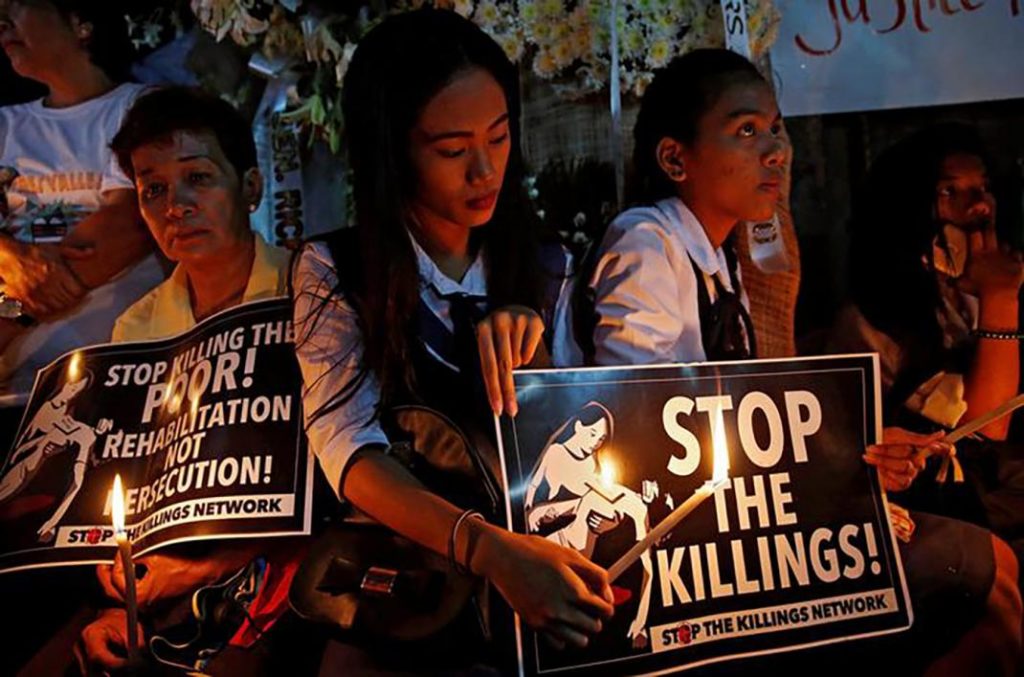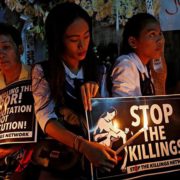
At least 6,847 suspected drug offenders have been killed in alleged shootouts in association with President Rodrigo Duterte’s three-year crackdown on illegal drugs, according to the latest count by the Philippine National Police (PNP).
Data from July 1, 2016 to July 31 of this year — presented during the National Summit on Crime Prevention at the Manila Hotel on Thursday, August 15 —showed a total of 256,536 drug offenders were arrested in 163,767 police operations nationwide.
Meanwhile, 1,284,492 drug pushers and users surrendered under the government’s Oplan Tokhang campaign.
A total of 1,547,895 drug suspects have been accounted for since the start of Duterte’s presidency on July 1, 2016.
It can be noted that figure is higher compared to the 5,526 drug suspects killed in anti-drug operations that the Philippine Drug Enforcement Agency (PDEA) reported last month.
The National Police Commission (Napolcom) spearheaded the two-day anti-crime summit that serves as a forum to assess the prevailing crime situation in the Philippines, to monitor the extent of the implementation of government projects, and to formulate strategies that will benefit the community.
Rationalizing the framework for crime prevention in the next three years based on the policy guidelines of Duterte is the summit’s objective.
“This is pursuant to a presidential directive that seeks to end all forms of lawlessness in the country,” Napolcom vice chairman and executive officer Rogelio Casurao said.
As reported by the Philippine Star, the summit ended on Friday, August 16, with the presentation of policy recommendations and closing statements from Chief Justice Lucas Bersamin and Interior Secretary Eduardo Año.
The Napolcom said the summit not only seeks to rationalize the framework for crime prevention for the next three years based on the policy guidelines of the president but also to prepare the National Crime Prevention Program (NCPP) for 2020.
The framework hopes to address policy directions on crime prevention, corruption, criminal justice, counter-insurgency, drug abuse and control, as well as counterterrorism.
Members of the Napolcom Technical Committee on Crime Prevention and Criminal Justice were among the participants in the summit.
The committee consists of representatives from the five pillars of the criminal justice system: law enforcement, prosecution, courts, corrections and community, and other sectors of society.
According to Casurao, the annual NCPP is submitted to the President within 60 days before the commencement of each calendar year.
The Napolcom is mandated by Republic Act 6975 and RA 8551 or the PNP Reform and Reorganization Act of 1998, to create a yearly NCPP with the help and cooperation of the agencies operating under the five pillars of criminal justice.
PUP drug test
On Thursday, various youth organizations at the Polytechnic University of the Philippines (PUP) condemned the reported implementation of the mandatory random drug testing for students at the university’s College of Engineering.
Student publication The Engineering Spectrum reported that 40 College of Engineering students were sent to the Mabini campus for testing after they were randomly called from their classes on Wednesday.
Several youth organizations such as Gabriela Youth, Anakbayan and the League of Filipino Students mobilized at the PUP Mabini campus in Manila to condemn the conduct of mandatory random drug testing.
The National Union of Students of the Philippines, meanwhile, noted that the drug testing was implemented despite the ongoing process to revise the student handbook that provides its guidelines.
“On top of giving the College of Engineering Council Board a late notice, the admin also did not provide a waiver to notify the parents and request their consent,” said the group.
“It cannot be denied that mandatory random drug testing in schools is just another avenue for the war on drugs to be waged in campuses. As the union stated before, in a political climate in which vigilante killing supersedes due process, everyone can be a victim,” it added.
Kabataan party-list pointed out that Oplan Tokhang would be institutionalized inside schools and universities by the policy.
“This also serves as a risk to the security and privacy of the students and will do nothing in addressing the root causes of dangerous drugs and criminality in the country,” it said.
Earlier, the Commission on Higher Education (CHED) ordered all tertiary institutions to implement mandatory random drug testing on students in line with the provisions of the Comprehensive Dangerous Drugs Act.
The guidelines aim to promote “drug-free” campuses and further the legitimate interest of the government in preventing and stopping dangerous drug use among the youth, according to CHED chairman J. Prospero de Vera III.
He assured that the memorandum would see to it that the drug testing policies of higher education institutions are reasonable as well as not violative of the fundamental rights of students.





